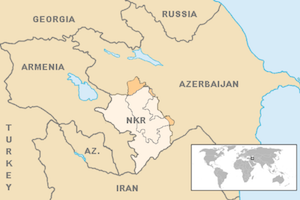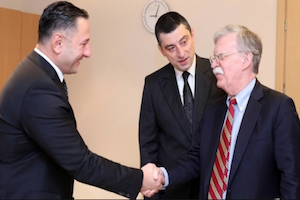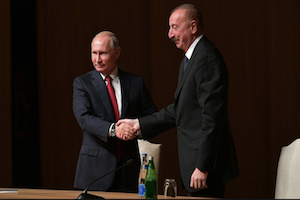Azerbaijan and Armenia Eager to Revive Nagorno-Karabakh Peace Talks
By Emil A. Souleimanov and Huseyn Aliyev
January 23, 2019, the CACI Analyst
Recent weeks have seen an unprecedented series of high-level meetings of Armenian and Azerbaijani representatives on Nagorno-Karabakh, Azerbaijan’s breakaway territory closely linked since the early 1990s to Armenia. Whereas many analysts considered resumed peace talks unlikely after the April 2016 fighting, Armenia’s Velvet Revolution and the replacement of the country’s war-hardened Karabakh elite with a forward-looking and liberal government has provided new stimulus in this regard. As Azerbaijani officials perceive the recent power shift in Armenia as a window of opportunity to advance a peaceful solution to the long-standing conflict, optimism regarding the prospect of a deal appears higher than in many years.

Bolton's Caucasian Tour and Russia's Reaction
By Eduard Abrahamyan
December 17, 2018, the CACI Analyst
On October 24-26, a U.S. State Department delegation headed by National Security Adviser Ambassador John Bolton visited the South Caucasian republics after talks in Moscow. The delegation’s visit to Azerbaijan, Armenia and Georgia was immediately dubbed a reinvigoration of U.S. policy towards the Caucasus and a pragmatic reengagement with the conflicted region. Bolton appeared to refine the evolving U.S. priorities with each country, categorizing them in accordance with political capabilities, shared interests and the roles that Georgia, Azerbaijan and Armenia respectively seek in relations with the West. The visit, however, caused an angry reaction from Moscow, especially given the issues Bolton raised in Yerevan.

Thinking Big About Caspian Energy
By Stephen Blank
November 29, 2018, the CACI Analyst
The signing of the Caspian convention in August 2018 has opened up exciting new possibilities for getting Central Asian oil and gas to European and global markets. The long-desired Southern Gas Corridor (SGC) from both shores of the Caspian has thus become a possibility. By thinking big, we can use Caspian gas for beneficial economic and political purposes. Whatever route Caspian energy takes to Europe, it must traverse the Caucasus and can be of substantial value in transforming the Eurasian geopolitical scene and agenda. Specifically, those parties who have the most to gain form resolving the Nagorno-Karabakh conflict can now devise a peace program that incorporates the use of energy to help foster an enduring peace between Armenia and Azerbaijan, reduce Russia’s ability to manipulate this conflict, and at the same time enrich them both as well as European consumers.

What Would Membership in the CSTO Mean for Azerbaijan and the South Caucasus?
By Fuad Shahbazov
October 18, 2018, the CACI Analyst
On August 16, the Azerbaijani MP and head of the Azerbaijan-Russia interparliamentary group Ali Huseynli told local media that “It would be advisable to consider Azerbaijan’s participation in the Collective Security Treaty Organization” (CSTO). The sensational statement triggered a public discussion on Azerbaijan’s possible membership in the Russia-led CSTO and its consequences for the region. While some state officials described this prospect as a logical extension of Baku’s cooperation with Moscow, others strictly opposed the idea, stating that it would pose dangerous challenges to the country.

The Perspective of Trans-Caspian Gas Flow to Europe
By Ilgar Gurbanov
October 25, 2018, the CACI Analyst
On August 12, Azerbaijan, Kazakhstan, Russia, Iran, and Turkmenistan signed the Convention on the Caspian Sea’s Legal Status in Astana. The Convention’s provision endorsing the construction of a subsea pipeline raised optimism regarding the Trans-Caspian Gas Pipeline (TCGP) project, which has been stalled due to the Caspian’s uncertain status. Discussions on the TCGP have been ongoing since the 1990s, envisaging the export of 30 billion cubic meters/year (bcm/y) of Turkmen gas to Europe across the Caspian by integrating with the Southern Gas Corridor (SGC).






 Book S. Frederick Starr and Svante E. Cornell,
Book S. Frederick Starr and Svante E. Cornell,